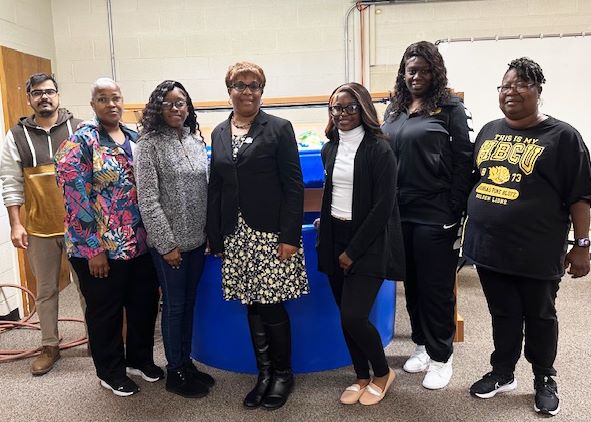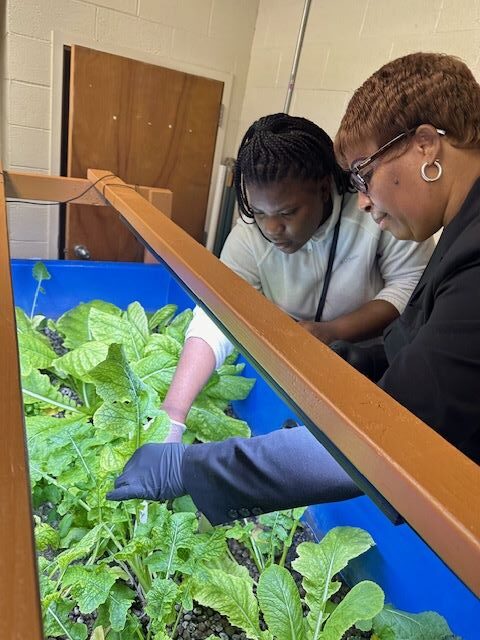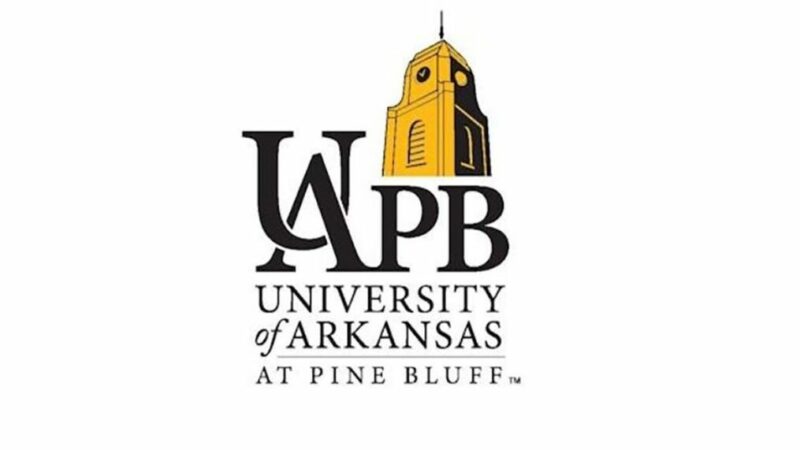The University of Arkansas at Pine Bluff is working to combat food insecurity and food deserts in Pine Bluff and Fayetteville, Arkansas through cooperation with local preK-12 schools, Dr. Karleah Harris, assistant professor for UAPB’s Department of Human Sciences, said. Specifically, the project focuses on teaching children to raise fish and grow vegetables and fruit indoors through the use of aquaponics systems.
“Aquaponics is a system where plants and fish are grown in the same water tanks,” Dr. Harris said. “The waste from the fish provides essential nutrients to the plants. Aquaponics systems are convenient solutions for schools or households because they can be set up and maintained indoors.”
Utilizing their aquaponics system, students and teachers at Watson Chapel Junior High School have gained hands-on experience raising channel catfish, while at the same time growing an assortment of fruits, vegetables and herbs including strawberries, mustard and turnip greens and spearmint.
“The teachers involved in this project – Ms. Quadrea Turner, Ms. ShaLa Jordan and Ms. Yvette Hammond – and their students have all been responsible for planting and maintaining the fish and plants in the aquaponic system,” Dr. Harris said. “The school’s principal, Mr. Jeremy Vincent, also supports the project and is highly involved.”
Vincent said the chance to grow vegetables without soil and through the use of an aquaponics system with fish was an amazing experience for both students and teachers at Watson Chapel Junior High.
Jayla Laws, a student at the school, said, “The project with the UAPB Department of Human Sciences has been a great learning experience for my classmates and me. I had so much fun – I hope we continue to receive great opportunities like this one.”
Over the course of the project, students have learned about the importance of regularly eating fresh fruits and vegetables to promote health and prevent disease and obesity. They also learned about the health benefits of the food they had grown themselves – for example, that their home-grown produce included important vitamins, minerals, fiber and antioxidants, and that the catfish are rich in protein, vitamins, minerals and omega-3 fatty acids.
Jordan said she appreciated the chance to have her students collaborate with UAPB and Dr. Harris.
“This journey has been so amazing for our students – they have been overjoyed working with the fish as well as watching the plants grow,” she said. “The students were allowed to take some of the produce they grew home. I feel like programs like these put the students closer to reality, helping them understand the different aspects of food systems and careers.”
Dr. Harris hopes this information and knowledge of aquaponics will be passed down from generation to generation, helping youth learn how to live healthier in food desert environments and how to decrease obesity now and in the future.
Dr. Nathan Kemper, associate professor of community and rural economic development at the Dale Bumpers College of Agricultural, Food and Life Sciences and co-principal investigator on the grant, leads the University of Arkansas at Fayetteville portion of the project. He has teamed up with a local non-profit, Apple Seeds Teaching Farm, to deliver lessons to K-4 students about growing and cooking healthy foods.
Dr. Kemper said his focus is on behavioral change through experience with healthy foods that may be unfamiliar to some students. He is managing a team of four undergraduate students working to collect and assess data on how the lessons and culinary experiences affect students’ willingness to try new, healthy foods and whether these experiences can decrease food neophobia – the fear of trying new foods.
“We’ve all witnessed the magic of a child trying something new and seeing their eyes light up with amazement,” Dr. Kemper said. “And the lessons being supported by this project not only expose students to ways to incorporate fresh, healthy ingredients into delicious snacks and meals, but also teach them about where food comes from and how to start growing their own food in home and community gardens.”
Food deserts have been the focus of much research, but much of that research has focused on the supply side of access to healthy foods, he said. Although access is critically important, the demand side is where Kemper’s team has focused its research efforts.
“While teaching students how to grow food is very important, helping them develop good habits that lead to a lifetime of choosing healthy food options is equally important,” Dr. Kemper said. “Kids can have access to all the fresh fruit and vegetables they can imagine, but they may still choose to eat highly processed and unhealthy snacks. We want students to gain experience with healthy foods at a young age, to taste foods like spinach or kale, sweet potatoes or turnips. Then they can learn how to combine these healthy foods with other ingredients like fresh herbs and citrus, transforming them into a dish that becomes their new favorite food.”
Dr. John Anderson, director of the University of Arkansas Division of Agriculture Cooperative Extension Service, said early education is critical in shaping lifelong habits and attitudes, particularly concerning health and nutrition.
“Programming in this area is an urgent need in our state,” he said. “This program represents a unique approach to experiential learning. We believe it will not only enhance students’ knowledge in healthy eating and spark behavior change, but also cultivate a sense of responsibility and connection to their local environment. We are confident that this collaboration will yield significant benefits for the students, schools and communities involved that will continue long after this project is concluded.”
The collaborative project grant is titled “Healthy People Healthy Planet: A Food Desert Program at the University of Arkansas at Pine Bluff and Fayetteville, AR” (U.S. Department of Agriculture National Institute of Food and Agriculture award number 2021-38821-34712).
In addition to Dr. Harris and Dr. Kemper, project members include the following co-principal investigators: Dr. Janette Wheat, Dr. Felicia Taylor Waller and Kailash Bohara.
The project supports the development of curricula for programs at the pre-K-12 level in Arkansas to teach students how to grow their own vegetables, cook nutritious food and live in a healthy way. It strengthens the capacity of the two universities to build partnerships in food deserts, communities in which people have limited access to affordable and nutritious foods, especially fresh vegetables and fruits.









